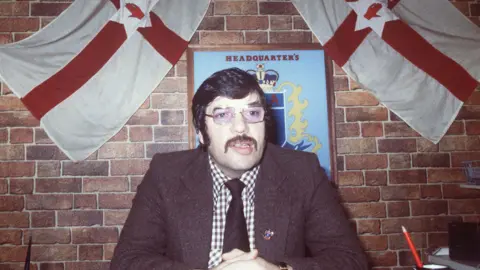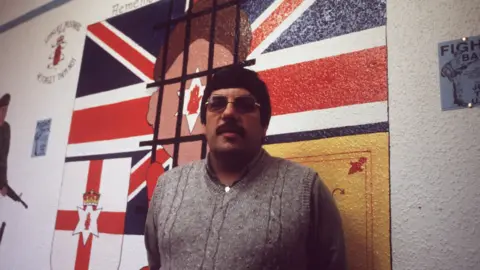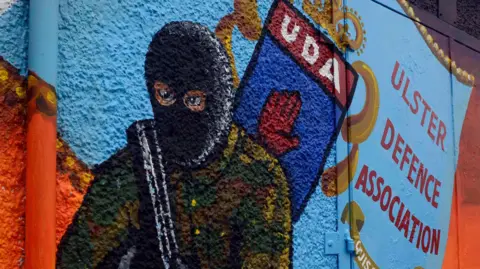Former UDA leader Andy Tyrie dies
 Pacemaker
PacemakerAndy Tyrie, a former leader of loyalist paramilitary group the Ulster Defence Association (UDA), has died.
Mr Tyrie, who was in his 80s and died on Friday, began his leadership of the paramilitary group in the early 1970s, during some of the bloodiest years of the Troubles.
He continued until the late 1980s when he avoided death in a car bomb attack and resigned.
He later backed the Ulster Democratic Party's (UDP's) support of the Good Friday Agreement, which brought an end to the 30-year conflict in 1998.
 Pacemaker
PacemakerA prominent figure within loyalism, the Loyalist Conflict Museum in east Belfast, which recounts the history of the UDA, was originally called the Andy Tyrie Interpretive Centre.
Former chair of the Parades Commission and Community Relations Council, Peter Osbourne, paid tribute on X, writing: "In the years that I knew him, Andy Tyrie was an advocate for tolerance, reconciliation, and on those issues that particularly affect working-class communities."
Mr Tyrie emerged as UDA leader after former leader Tommy Herron was shot dead in 1973.
The UDA, which formed in 1971, had tens of thousands of members at its peak and killed hundreds of people during the Troubles, often claiming responsibility under the cover name the Ulster Freedom Fighters (UFF).
It remained a legal organisation until it was banned in August 1992.
During his leadership, Mr Tyrie was involved in Ulster Workers' Council strike in 1974, a 14-day campaign of civil disobedience which brought down Northern Ireland's first power-sharing executive.
In 1999, he told The Observer that the UDA were not opposed to power sharing but "the Council of Ireland, which was being seen as a mechanism to roll us into a United Ireland".
 Pacemaker
PacemakerState papers released in 2005 showed that 30 years previously Mr Tyrie had organised talks between the UDA and the IRA, without the knowledge of many of his supporters.
Merlyn Rees, the then Northern Ireland secretary, told Prime Minister Harold Wilson that the meetings included a "certain amount of camaraderie".
In that interview with The Observer in 1999, Mr Tyrie said many of the things they had argued for had come to fruition through the Good Friday Agreement.
"We called for power sharing, sensible north-south co-operation under the control of a Belfast assembly and a council of the British Isles. All of this has happened and that is why I'm happy about the new government at Stormont."
